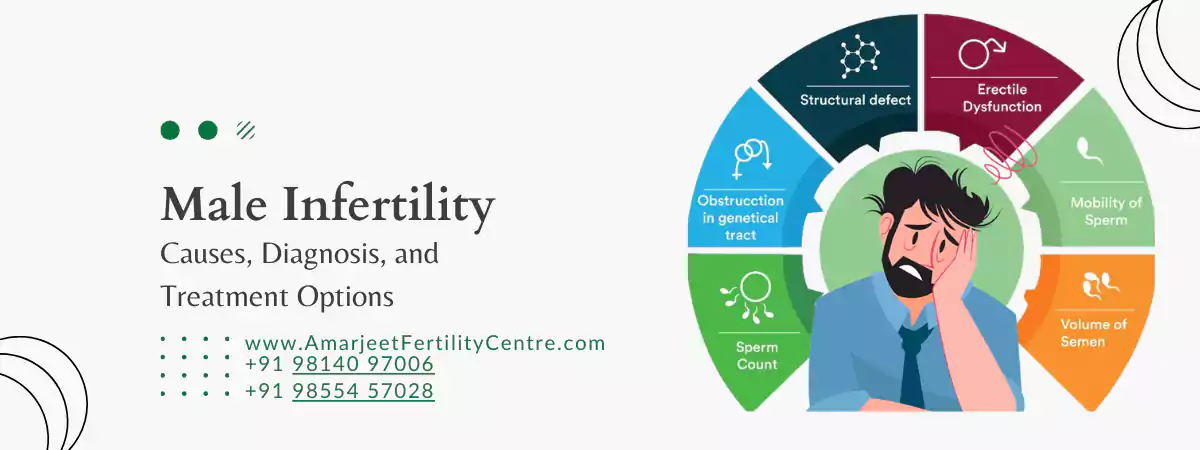Male infertility is a significant health concern affecting millions of couples worldwide. While often overshadowed by discussions about female fertility, male infertility plays an equally crucial role in conception difficulties. Understanding its causes, effects, and available treatment options is essential for couples struggling to conceive and for healthcare professionals striving to provide comprehensive reproductive care.
What is Male Infertility?
Male infertility refers to the inability of a man to impregnate a fertile female partner despite regular, unprotected intercourse for an extended period, typically one year. It accounts for approximately 40-50% of infertility cases, either solely or in combination with female infertility factors.
Causes of Male Infertility
1. Sperm Disorders:
- Low Sperm Count (Oligospermia): A condition where the semen contains fewer sperm cells than normal.
- Poor Sperm Motility (Asthenospermia): Sperm cells are unable to move efficiently, hindering their ability to reach and fertilize the egg.
- Abnormal Sperm Morphology (Teratospermia): Sperm cells have abnormal shapes, affecting their ability to penetrate the egg.
2. Medical Conditions:
- Varicocele: A varicose vein in the testicles, leading to overheating and impaired sperm production.
- Infections: Sexually transmitted infections or other infections affecting the reproductive system can disrupt sperm production and function.
- Hormonal Imbalances: Disorders such as hypogonadism or hyperprolactinemia can impact sperm production.
- Genetic Factors: Chromosomal abnormalities or inherited conditions like Klinefelter syndrome can cause infertility.
3. Lifestyle Factors:
- Smoking: Tobacco use can decrease sperm count, motility, and morphology.
- Alcohol and Drug Abuse: Excessive alcohol consumption and drug use can impair sperm quality.
- Obesity: Being overweight can affect hormone levels and sperm production.
- Stress: High levels of stress can interfere with hormone regulation and sperm production.
Effects of Male Infertility
1. Emotional and Psychological Impact:
- Infertility can lead to stress, anxiety, depression, and feelings of inadequacy in men.
- Strained relationships with partners due to the pressure of trying to conceive.
2. Social Stigma:
- Cultural and societal norms may place undue pressure on men to father children, leading to feelings of shame or embarrassment.
3. Financial Burden:
- Seeking fertility treatments can be expensive, adding financial strain to couples already facing infertility challenges.
Treatment Options
1. Lifestyle Changes:
- Adopting a healthy diet, regular exercise, and avoiding harmful habits like smoking and excessive alcohol consumption can improve sperm quality.
2. Medications:
- Hormonal medications can correct imbalances that affect sperm production.
- Antibiotics may be prescribed to treat infections impacting fertility.
3. Assisted Reproductive Technologies (ART):
- Intrauterine Insemination (IUI): Sperm is directly inserted into the uterus during ovulation.
- In vitro Fertilization (IVF): Sperm and egg are combined in a laboratory dish, and the resulting embryo is transferred into the uterus.
- Intracytoplasmic Sperm Injection (ICSI): A single sperm is injected directly into the egg to facilitate fertilization.
4. Surgical Interventions:
- Varicocelectomy: Surgical repair of varicoceles to improve sperm production.
- Testicular Sperm Extraction (TESE): Sperm is directly extracted from the testicles for use in ART procedures.
Conclusion
Male infertility is a complex issue with multifaceted causes and effects. While it can pose significant challenges to couples hoping to conceive, advancements in medical science offer various treatment options to address infertility issues effectively. Seeking early diagnosis and appropriate treatment can greatly enhance the chances of overcoming male infertility and achieving the dream of parenthood. Additionally, raising awareness and reducing the stigma surrounding male infertility is essential for providing support and understanding to individuals and couples facing these challenges.


